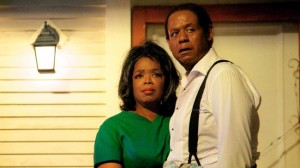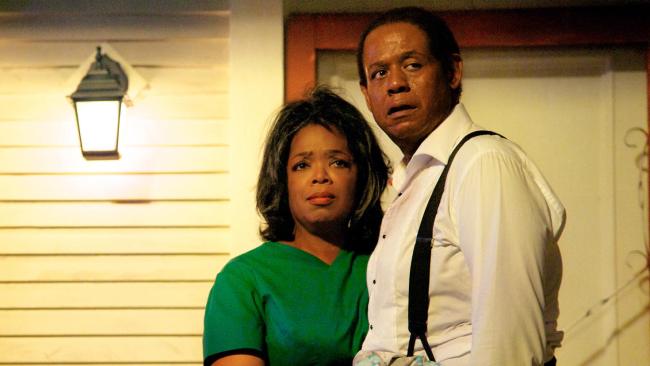
Parade this Sunday features a very personal conversation with Forest Whitaker, Oprah Winfrey, and director Lee Daniels (Precious) about their new movie and the questions it raises about race in America.
The powerful chronicle of one black man’s years of service in the White House during the most tumultuous period in the nation’s civil rights history, Lee Daniels’ The Butler (in theaters Aug. 16) was a labor of love for the trio.
Whitaker, 52, plays Cecil Gaines, whose experiences attending presidents from Eisenhower through Reagan are loosely based on those of Eugene Allen, a White House butler who died in 2010.
Winfrey, 59, in her first dramatic role since 1998’s Beloved, plays Gaines’s wife, Gloria, who battles a drinking problem and watches her husband clash with their activist son. The film revisits major events—the Freedom Rides, the lunch counter sit-ins, the Kennedy and Martin Luther King Jr. assassinations—through their impact on the Gaines family. Here are a few highlights from the interview:
On why this film brought Oprah back to acting:
Oprah Winfrey: Lee was relentless. I remember being on my mountain in Maui, where I go to try to restore myself. And he called saying, “You need to get ready, because you are Gloria.” So I did it to have the opportunity to work with Lee. I also did it because Gloria represented to me every woman of that era who sacrificed herself … never bringing her own dreams to fruition because family took precedence over everything. It’s a story many have not seen with black people in these roles, because usually we’re one extreme or another. But to see that we are people who love our children, who have the same aspirations as everybody else—I just love that.
On using the N-word:
Lee Daniels: It’s a word I used quite a bit, until Oprah sat me down and talked to me about its power.
Winfrey: You cannot be my friend and use that word around me. It shows my age, but I feel strongly about it. … I always think of the millions of people who heard that as their last word as they were hanging from a tree.
Forest Whitaker: I don’t use the word. Never did.
On whether young people today know enough about the civil rights movement:
Winfrey: They don’t know diddly-squat. Diddly-squat!
Daniels: I showed the film to my relatives … because I figured they’re the harshest of audiences. And my 30-year-old nephew said to me, ‘Did some of this stuff really happen?’ And I was very upset by that.
On their experiences of racism, and the valuation of life:
Whitaker: I’ve had many incidents in my life of racism. I’ve been thrown on the ground. I’ve been frisked. I’ve been arrested so many times I couldn’t tell you. I have no need to talk about it.
Daniels: It’s a given. I can’t even get a taxi [in New York]. I send my [white] assistant out to get a taxi because I can’t.
Whitaker: The movie deals with the valuation of life, too. Like, whose life is valuable? Is it okay to take life? In terms of today, [the film] Fruitvale Station [of which Whitaker is a producer] is playing, about the shooting of Oscar Grant in the Oakland BART station, which just happened in 2009.
Winfrey: And the shooting of Trayvon Martin.
Whitaker: If you can’t accept that these things are going on, you’re living an illusion. So the question at this point is more of, how can we move the needle forward? Can we speak up? I think this film helps that in some way.
Winfrey: Yeah. But do we live in a land where Martin Luther King’s dream has been ultimately fulfilled? No. Has part of the dream been fulfilled?
Daniels: Yes.
Winfrey: [nods] Are more people judged by the content of their character than by the color of their skin? Yes. Is everybody judged by the content of their character? Absolutely not.
On who they think needs to see this movie:
Winfrey: America.
Daniels: That’s good. And kids need to see this movie. I’m fighting to get a PG-13 rating.
Winfrey: This is your answer: People need to see this movie.

